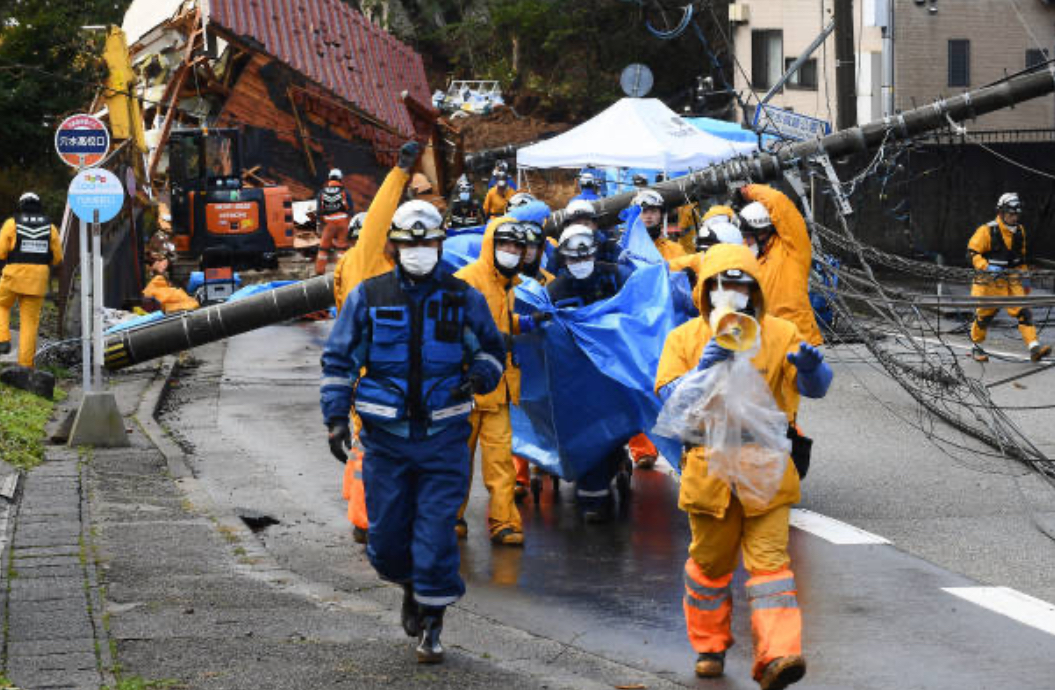Less than 24 hours into 2024, a staggering amount of hardship befell Japan. Starting on New Year’s Day, the country was bombarded by a back-to-back series of tumultuous events.
The string of disaster began just after 4:00 p.m. on Jan. 1 as a 7.5-magnitude earthquake struck central Japan, destroying buildings, cutting off power to over 10,000 homes, and sparking major fires all over the coast.
“There were almost no houses standing,” mayor Masuhiro Izumiya said in an interview with TBS, referring to the destruction of the coastal city Suzu. “About 90% of the houses [in the town] are completely or almost completely destroyed…the situation is really catastrophic.”
The quake struck on one of the only days of the year that nearly all Japanese citizens take off. In Japan, New Year’s Day hosts the country’s biggest festival, where families gather to eat together and share their hopes for the new year. However, instead of ringing in 2024 with hopeful celebration, the majority of Japan spent the day huddled in quake shelters, fearing for their lives.
“I haven’t been able to sleep,” a woman at a shelter in the town of Shika said in an interview with TV Ashai. “I’ve been scared because we don’t know when the next quake will hit.”
As Japanese rescuers searched for survivors, authorities warned of further landslides, heavy rain, and even tsunamis. However, no one could’ve predicted the next day’s events: on Jan. 2, a Japan Airlines plane collided with a quake aid plane at Tokyo’s Haneda Airport, killing five crew members and injuring 14 passengers.
“I was wondering what happened and then I felt the airplane tilted to the side at the runway and felt a big bump,” telecommunications worker Satoshi Yamake told Reuters journalists. “The flight attendants told us to stay calm and instructed us to get off the plane.”
Luckily, it has been reported that all 379 passengers aboard the plane were eventually able to escape the burning airliner, but the holiday’s celebrations were soured even further. Annual celebratory visits to the Imperial Palace were canceled as Emperor Naruhito and Empress Masako conveyed their sympathies to victims of both disasters.
“The Emperor and Empress expressed their sympathy for survivors and appreciation for those involved in disaster response efforts in a message sent to Ishikawa Governor Hiroshi Hase,” Japan’s Imperial Household Agency said to Jiji Press in a press release.
Encouragingly, however, Japan’s struggle did not go ignored. Later on Jan. 2, President Joe Biden acknowledged the devastating effects of both the quakes and the plane crash, conveying readiness to provide assistance to Japan.
“As close allies, the US and Japan share a deep bond of friendship that unites our people,” President Biden said in his statement. “Our thoughts are with Japan in this difficult time.”
Three days later, the US government announced that it would provide $100,000 in assistance to Peace Winds Japan, an organization working in the affected areas.
“I’m quite certain that Japan will be able to deal with the issues [using] both its own resources and others’ efforts as time goes by,” an unnamed reporter from Newsx Live said in a video report, commenting on the effectiveness of America’s support.
Outside of government aid, individuals are encouraged to support the Japanese people. Organizations such as the Japanese Red Cross Society, Global Giving, and The Nippon Foundation collect donations to provide necessary crisis relief.




